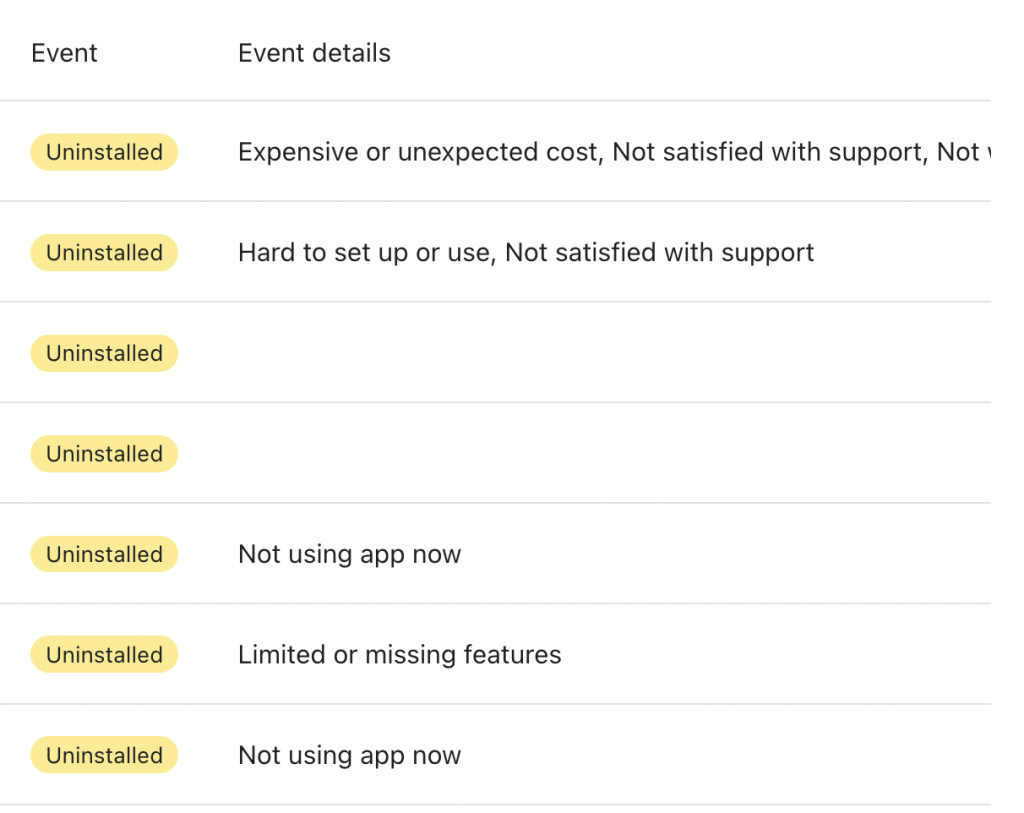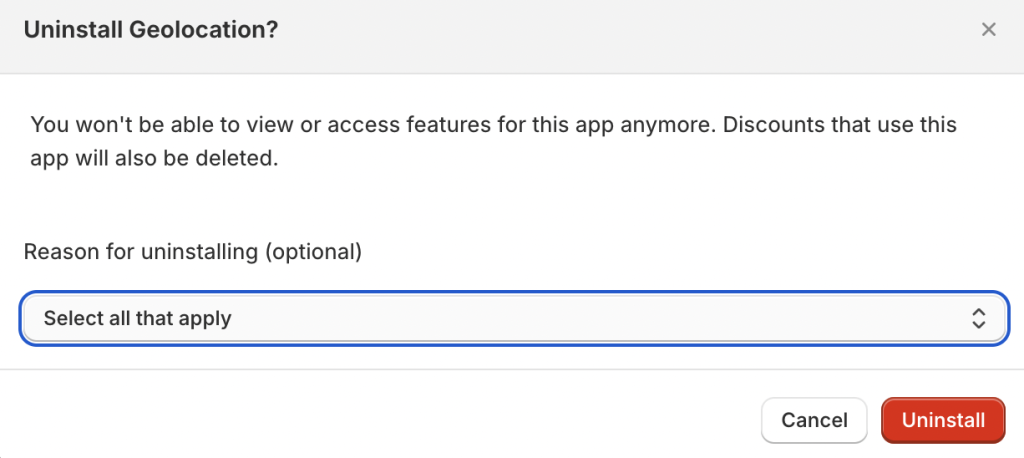It’s difficult to make any business profitable, but Shopify apps have additional obstacles you have to work around to make revenue > expenses.
While it’s true that the Shopify App Store can bring you many customers organically, it has some essential problems that make it a stressful place to build a company.
Though this is an emotionally-charged article, my goal is not to be an asshole. There’s simply no point sugar coating, when constructive criticism would have more impact.
Plus, I’m not only here to complain – each complaint has a proposed solution.
Everyone wants free apps
The simple truth is, the average Shopify merchant does not value software highly. This is probably because most businesses are small, and small businesses are not usually very profitable, so they are mindful of expenses.
This is why free apps get so many 5-star reviews, even if they have limited functionality.
I’m not here to tell people they should pay more for software. The problem here is that reviews are weighed above seemingly everything else in the Shopify App Store, which, because free apps get more 5-star reviews, favors free apps.
I would even go so far as to say that if your goal is Shopify App Store organic growth, you can cheese the system with this strategy:
- Make your app free – this will boost installs
- Invest into Shopify App Store ads – acquire customers at a loss, but you’ll be shutting out competition who can’t afford to work for free
- Offer as close to 24/7 support as possible – this way, you will maximize the % of customers who leave reviews
- Once you have way more reviews than your competitors, go paid, and shut off ads (you no longer need them, due to how heavily reviews are weighted).
Sound familiar? Yeah, it’s called predatory pricing. That’s literally the type of business model the review-based ranking system incentivizes. I’m not telling you to do that. Don’t blame me if you try that out and get sent to prison.
Let’s be honest – software in the cloud has recurring costs. While I can understand smaller stores want to use software for free, I don’t want to serve these people. I don’t have any sympathy for them, either — if you’re using my software to make money, then you need to pay me. Don’t like it? Then use a free app. No hard feelings. I would just rather focus on giving my paying customers an incredible experience.
My app has a free plan – but it’s only for development stores. This is clearly mentioned in at least 3 places:
- Our app listing page
- Our in-app pricing page
- Our “Pricing FAQ” helpdesk page

The issue is – nobody reads anything (more on this later)! That leads to wasted ad clicks on people who only installed because they thought they could get a quality app for free.
Look, if someone really thinks $20/month (that’s $0.67 per day) is an “expensive or unexpected cost,” then that’s their business. I just don’t want them to be even able to find my app. That wastes everyone’s time, and puts me at risk of receiving a drive-by 1-star review from someone who won’t even still be on Shopify a year from today.

Solution: Allow App Store listings to contain “Partner-friendly” price tiers, which are only visible to people on development stores.
This would allow merchants to still find free apps, but also prevent wasted ad spend/time on apps that are actually paid.
Limited churn feedback

Churn is the achilles heel of any subscription business. This is why, usually, when you cancel a SaaS subscription, you’re shown a pop up asking why you’re not going to pay anymore.
In Shopify apps, however, you have limited options to mitigate churn. Besides the fact that many stores eventually go out of business, the platform itself limits how much feedback you can get from people who uninstalled.
When a store uninstalls your app in Shopify, you have no control over the message they’re shown. If they were just shown an optional textarea where they could leave feedback, that would be enough to get meaningful insights on churn.

Instead, when a merchant uninstalls your app, all they see is a dropdown select, where they can select pre-written “[Reasons] for uninstalling.” This is bad for 2 reasons:
- Merchants don’t even see the optional textarea until they have already selected an option.
- The pre-written uninstall reasons are so vague, that they offer no insights to app developers.
Here are the pre-written responses:
- “Not using app now”
- “Hard to set up or use”
- “Not satisfied with support”
- “Limited or missing features”
- “Expensive or unexpected cost”
- “App security or privacy issues”
- “Not working or compatible with store”
With more specific feedback, app businesses would be able to improve their apps and offer better experiences for merchants. But with uninstall reasons this vague, all we know is that there is a problem somewhere, without an actionable way to solve it.
To work around this, app companies often send an email after uninstall. But this has major issues:
- Almost nobody responds, because by the time they check their email, they’ve moved on.
- No matter how you slice it, post-uninstall emails are marketing emails. In the age of GDPR, I’ve elected to not email anyone who hasn’t explicitly opted in.
Solution: Get rid of pre-written responses entirely, and always show the optional textarea.
Unreasonable people have too much power
Every business on Earth has to deal with people it doesn’t like. You just have to deal with it. But if you run a Shopify app business, where reviews determine your organic traffic, those people can cause major damage to your acquisition funnel.
This puts unnecessary pressure on every user interaction.

This person’s reasons for uninstalling: “Hard to set up or use, Not satisfied with support”
Meanwhile, they ignored everything we said to them.
I legit sent them a link to a video demo of the exact thing they were trying to set up! And after all that, they’re “not satisfied with support”? Give me a break.
And that’s just an example of someone who actually bothered to get in touch with us in the first place before rage quitting.
Unfortunately, because of the looming threat of a 1-star review, we have to bend over backwards for EVERYONE who installs our app, even the time wasters.
Actually, scratch that – especially the time wasters, as those are the people who can potentially have the biggest negative impact on your bottom line.

To date, my only 1-star review is from someone who used our app for a total of 8 minutes, while I was sleeping. They signed up, ignored all tutorials, didn’t make any attempt to communicate with us, and then left a 1-star review because our app didn’t have a feature that wasn’t even advertised anywhere on our app listing page.
This was infurating, because:
- We now have to wait 24 hours or more to see reviews after they are posted, so I couldn’t reply quickly enough for them to reconsider their review
- We have a feature request board for things like that. I went through a lot of pain to make it super easy for customers to access.
- This single 1-star review has more impact than any of my 22 5-star reviews (which, by the way, I earned through blood, sweat, and tears).
Solution: Stop weighing reviews so heavily in organic search rankings.
- They give unreasonable people (Karens) too much power to affect someone’s business.
- They give free and low quality apps an unfair advantage. For a free app, most reviews will simply be due to the fact that the app is free, instead of its quality. For a buggy app, most reviews will be about the quality of customer support. This hurts quality apps AND merchants, by making good apps harder to find.
Conclusion
As my app grows, and I run into these pain points more frequently, I will be evaluating other ways to fuel customer acquisition besides organic growth:
- Shopify App Store ads
- Shopify Community Forums
- SEO
- Agency partnerships
- App partnerships
- Email marketing
I would definitely recommend that any app developer who intends to build a sustainable business make plans to stop relying on organic App Store growth. Not only will it make your business more defensible, but it will make you a whole lot less stressed.